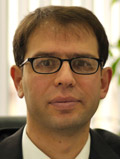ENGEL
Injection moulding machinery maker sees increase in demand for European plastics machinery in Turkey / Local market dominated by automotive segment
 Abdulkadir Topuçar (Photo: Engel) |
The rise in both visitor and exhibitor numbers at this year’s “Plast Eurasia” industry fair, held in Istanbul / Turkey from 27 to 30 November 2011 (see Plasteurope.com of 02.11.2011), illustrates the country’s ongoing plastics boom. The injection moulding sector, especially, is posting high growth rates, not least as a result of Turkey’s budding automotive sector, which numerous international OEMs rely on. Even though Chinese plastics machinery still dominates in Turkey’s plastics processing sector, there has been a marked increase in plastics machinery made in Europe as well, says Abdulkadir Topuçar, CEO of Engel Enjeksiyon Makineleri, the Istanbul-based branch of Austrian injection moulding machinery maker Engel (Schwertberg; www.engelglobal.com).
Even though Chinese machinery remains the cheaper option, Engel’s experience in Turkey shows that many plastics processors also opt for the Austrian machinery because of its high integration and automation standards, its low energy consumption and its highly developed processing technology. All these factors increasingly play a role in automotive production, as weight prerequisites are increasingly lowered and composites used to replace heavier materials.
Topuçar points out that Turkish processors are constantly feeling the pressure of prices, largely since the country does not produce sufficient feedstocks to meet domestic demand and therefore has to rely on imports. In addition, many companies continue to moonlight their activities, evading the tax authorities, which gives rise to an unfair competitive climate.
Engel Enjeksiyon Makineleri was founded on 1 May 2008. Today, the activities of the office’s 13 employees are key to serving neighbouring countries, too, including the markets of Iraq, Iran and Kuwait.
Even though Chinese machinery remains the cheaper option, Engel’s experience in Turkey shows that many plastics processors also opt for the Austrian machinery because of its high integration and automation standards, its low energy consumption and its highly developed processing technology. All these factors increasingly play a role in automotive production, as weight prerequisites are increasingly lowered and composites used to replace heavier materials.
Topuçar points out that Turkish processors are constantly feeling the pressure of prices, largely since the country does not produce sufficient feedstocks to meet domestic demand and therefore has to rely on imports. In addition, many companies continue to moonlight their activities, evading the tax authorities, which gives rise to an unfair competitive climate.
Engel Enjeksiyon Makineleri was founded on 1 May 2008. Today, the activities of the office’s 13 employees are key to serving neighbouring countries, too, including the markets of Iraq, Iran and Kuwait.
07.11.2011 Plasteurope.com [220736-0]
Published on 07.11.2011

 German version of this article...
German version of this article...